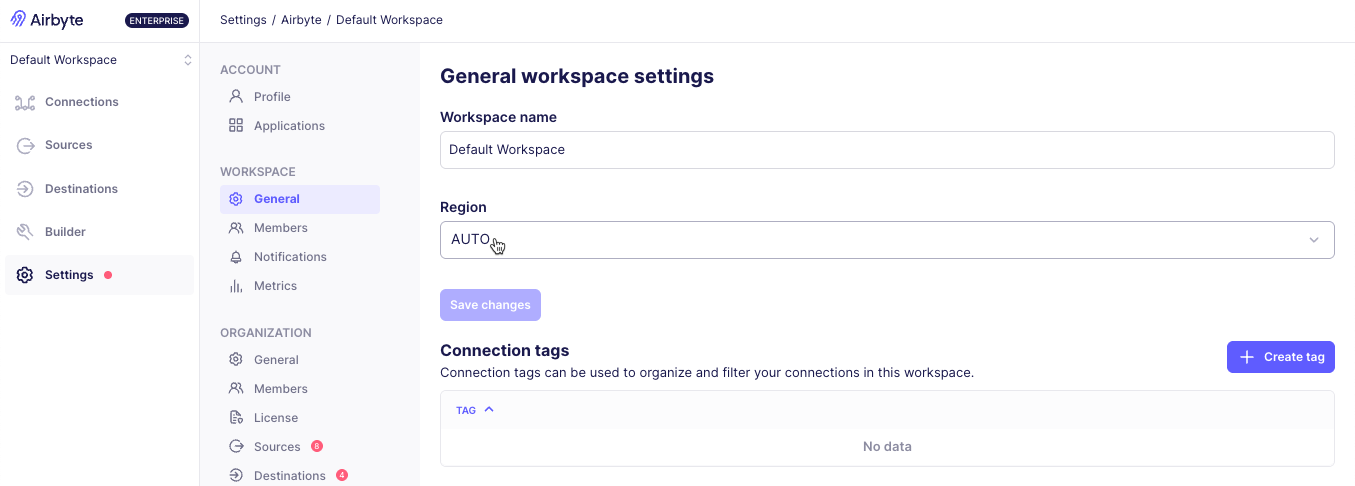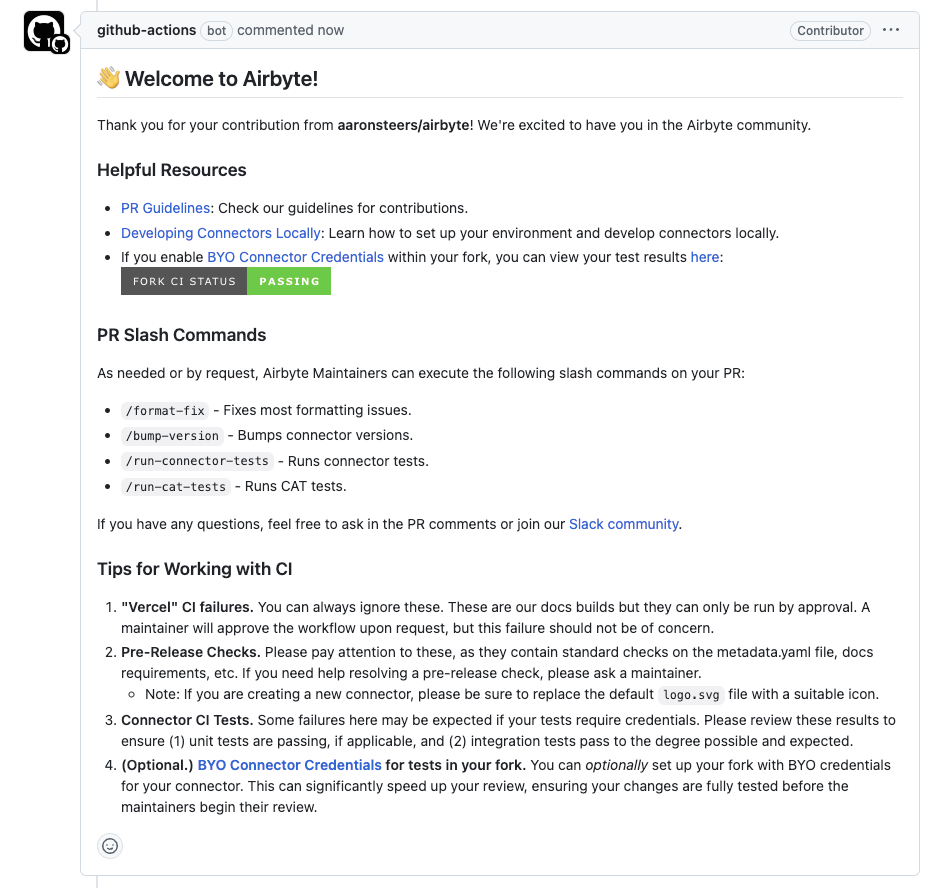Airbyte 1.7
People liked the last version of Airbyte so much that we decided to ship another one 🚢. Airbyte 1.7 was released on June 16, 2025. We're excited to share new improvements and changes to the Airbyte platform.
Platform changes
These changes improve Airbyte for everyone.
Move files and records together
Airbyte now supports moving files and records in the same connection. The combination of structured and unstructured data drives more robust knowledge systems that have more context, which is critical to successful AI systems.
-
In connectors that move structured data but also contain attachments, like ZenDesk Support, when you set up your connection, you can choose to move attachments as a separate stream in the same connection. Airbyte also generates metadata describing those files.
-
In file-based connectors, like S3 or Google Drive, when you choose Copy raw files as your delivery method, Airbyte generates metadata describing those files.
-
You choose the format and content of the metadata the same way you already manage your streams.
Connector Builder and low-code improvements
Airbyte's Connector Builder and low-code CDK have new features to interact with a wider range of more complex APIs. These changes allow Airbyte to migrate more connectors to the low-code format. Low-code connectors are forkable, faster, and easier for everyone to contribute to.
Stream templates
Use stream templates to generate multiple similar streams from a single template configuration. Stream templates are ideal for APIs that have multiple regions or a large number of resources that have predictable endpoint structures. Learn more >
File syncing
The low-code CDK now supports syncing files up to 1.5-GB. You can implement this feature with manifest.yaml files in a manifest-only or hybrid connector when making requests from endpoints that return files. Learn more >
Property chunking
Some APIs don't send a complete set of properties for a record in a single API request, so connectors have to make a series of requests, then merge those responses into a single record. Connector developers working with the low-code CDK can now chunk properties, specify the chunk size, and statically or dynamically define the list of properties to fetch. Learn more >
Config normalization rules
The Spec component in the low-code CDK now supports config_normalizaton_rules. Use this to automatically modify, migrate, and validate user configurations before your connector uses them and without needing to write custom Python code. It consists of three arrays.
-
config_migrations: Apply discrete, one-time transformations to migrate user configurations from old formats to new ones. -
transformations: Apply configuration modifications at the start of each sync, dynamically modifying configurations based on current values. -
validations: Apply validation checks after the connector completes transformations to ensure data integrity and proper formatting.
Self-Managed Enterprise changes
These changes bring new capabilities to Airbyte's Self-Managed Enterprise customers.
Before upgrading from version 1.5.1 or earlier, you must upgrade your service account permissions. If you don't, Airbyte doesn't permit you to begin the upgrade. Learn more >
Audit logs
Self-Managed Enterprise now supports audit logging. Audit logging gives you visibility into data, environment, user, and permission changes. This data ensures you have records of any unauthorized changes and insider threats, making it easy to continue meeting your compliance obligations while using Airbyte.
Audit logging requires you to configure a blob storage solution (S3, GCS, Azure Blob Storage). This bucket must be accessible by Airbyte's pods using the same credentials it uses to access your log and state storage. Then, you configure Airbyte to read from and write to your bucket with Airbyte’s values.yaml file:
Once enabled, Airbyte writes audit logs to the /audit-logging/ directory as JSON files named in this format: <yyyyMMddHHmmss>_<hostname>_<random UUID>.
{
"id": "8478fcbd-d369-4bda-8d9b-b782cea5ad40",
"timestamp": 1746724563299,
"actor": {
"actorId": "1c26c465-58h8-43e6-8jko-2252b7g8a9e2",
"email": "[email protected]",
"ipAddress": "192.000.000.0",
"userAgent": "Mozilla/5.0 (Macintosh; Intel Mac OS X 10_15_7) AppleWebKit/537.36 (KHTML, like Gecko) Chrome/136.0.0.0 Safari/537.36"
},
"operation": "deleteWorkspace",
"request": "<request object>",
"response": "<response object>",
"success": true,
"errorMessage": null
}
Assign data planes from Airbyte's UI
If you're using multiple data planes, you can now assign a workspace to a region from Airbyte's workspace settings. Previously, you could only do this with the API. Learn more >

Known issues
- Customers using generic OIDC for single sign on (rare) can't use the Connector Builder due to an authentication issue. If you use generic OIDC, Airbyte recommends that you don't upgrade to 1.7 until a patch is available for this issue.
Contributors: airbyte-ci is deprecated
Everyone is welcome to contribute to Airbyte. In most cases, the best way to contribute to Marketplace connectors is with Airbyte's Connector Builder. Some connectors still require using one of Airbyte's connector development kits (CDKs), though.
To simplify and speed up connector development, Airbyte has deprecated the airbyte-ci tool.
-
Most
airbyte-cicommands have simpler equivalents in Poe the Poet. -
Airbyte's GitHub repository provides new, more helpful messages in your pull requests.
-
Airbyte has removed 8 legacy GitHub workflows that were no longer necessary.
-
The new Connector CI suite of checks is between 2 and 10 times faster for rapid iteration with less waiting.
-
Maintainers can still manually run connector acceptance tests (CATs 🐈) if needed.
For help developing your own connectors, see Developing connectors locally.

Connector Builder off in low resource mode
In abctl version 0.26.0, if you deploy Airbyte in low resource mode, the Connector Builder is now turned off. To access the Connector Builder, allocate Airbyte's suggested resources and re-deploy Airbyte without setting the --low-resource-mode flag.